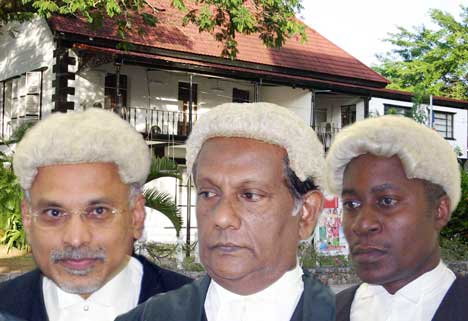CONSTITUTIONAL COURT
REWRITING INSTEAD OF INTERPRETING CONSTITUTION

This week the Constitutional Court gave its ruling in a case of national interest brought by Mr. Paul Chow. In essence, in his petition, Mr. Chow alleged that a General Election should only be called during the period starting at the beginning of the fifty-seventh month and ending at the end of the fifty-ninth month of a session of the National Assembly- under Article 79 (1) of the constitution. The effect of the dissolution is that the 25 elected members cease to be members of the National Assembly and those seats are now vacant as per Article 81 (1) (a) of the Constitution .When this happens, by-elections should be called within 30 days, Article 79 (2). Thus, the announcement and publication of the dates of the general election, namely 10th, 11th, and 12th May 2007 by the Electoral Commissioner is a contravention of the Constitution, being 50 days after the dissolution.
The Constitutional Court comprising of Perera J (presiding) Karunakaran J. and Gaswaga J. decided that the case should be dismissed. Perera J rightly stated that if the case were to succeed it would lead to would to a “constitutional crisis” and therefore it becomes imperative that the case be dismissed. It is this statement, by Perera J. that led Mr. Frank Elizabeth to conclude on SBC television that the Court was more concerned about the “consequences” of the case; hence his declaring that “in giving the Constitution a fair, liberal and purposive interpretation, Article 81(1)(a) must be saved from the operation of Article 79(2) for the latter provision to be meaningful” and goes on to declare that the petitioner has not only failed to prove a prima facie contravention but also to show how his interest has been affected. But in this instance Perera J felt the need to go further and unleashed a vitriolic personal attack on both the petitioner and his counsel and this, despite the court having allowed an amendment to the Petition.
Karunakaran J also dismissed the case, because the petition failed to disclose a cause of action and was “misconceived, incompetent, devoid of merit and improperly constituted and so, untenable in law,” but he agreed with Mr. Elizabeth that the petition was not frivolous or vexacious, nor was it an abuse of the process of the court as argued by the Attorney-General.
Gaswaga J. agreed with both judges that the petition should be dismissed and agreed with Perera J’s reasons for dismissing the case.
The question of “locus standi” or “interest” is a favourite preliminary objection from the Attorney-General, the same ground was used to throw out the case brought by the Bar Association when it contested the reappointments of certain foreign judges. The decision will be appealed.


